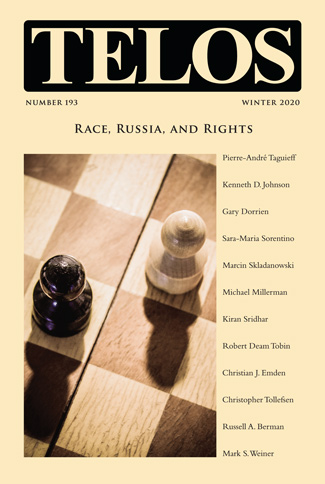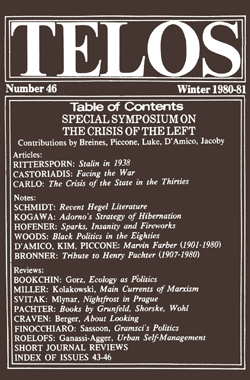By David Pan · Friday, December 18, 2020 Telos 193 (Winter 2020): Race, Russia, and Rights is now available for purchase in our store. Individual subscriptions to Telos are also available in both print and online formats.
 What is not up for discussion? The answer to this question defines a political order, and the repressiveness of such an order will depend on where this boundary is set between the discussable and the undiscussable. But it is not as if more discussion necessarily means less repression. Certain topics—genocide, torture, slavery—definitely need to be off the table as legitimate political measures. Other topics—the choosing of rulers and historical facts—need to be discussable in order to avoid tyranny. In between lies a gray area whose definition will establish the character of each political order. Conversely, a lack of consensus on this issue will lead to political instability that goes beyond the content of political debates, indicating that the question of discussability coincides with the problem of political identity. This issue of Telos will consider three areas in which discussability has become the main issue, leading to implacable conflict. What is not up for discussion? The answer to this question defines a political order, and the repressiveness of such an order will depend on where this boundary is set between the discussable and the undiscussable. But it is not as if more discussion necessarily means less repression. Certain topics—genocide, torture, slavery—definitely need to be off the table as legitimate political measures. Other topics—the choosing of rulers and historical facts—need to be discussable in order to avoid tyranny. In between lies a gray area whose definition will establish the character of each political order. Conversely, a lack of consensus on this issue will lead to political instability that goes beyond the content of political debates, indicating that the question of discussability coincides with the problem of political identity. This issue of Telos will consider three areas in which discussability has become the main issue, leading to implacable conflict.
Continue reading →
By Sean McMorrow · Tuesday, October 13, 2015  “Facing the War” is a translation from the first section of Devant la guerre, Cornelius Castoriadis’s least regarded work within English-speaking circles. The reason for this marginalization is its central claim that Russian society had transformed into a stratocratic regime, with increased probability for an escalation into a Third World War. Castoriadis’s critics claimed he had missed signs of perestroika and glasnost already on the horizon. Viewed from this perspective, history could not have been more cruel to Castoriadis. However, the value of his work does not depend on a predictive mode of political analysis, a point that is clearly prefaced in this work: calls for predictive accuracy ignore the radical character of historical contingency. In fact, the unexpected events put into motion later by Gorbachev only strengthen Castoriadis’s perspective in the sense that such a development represents the deeper problem of historical indeterminacy, and it is in this respect that his analysis is finely tuned to any society’s condition of historical contingency. “Facing the War” is a translation from the first section of Devant la guerre, Cornelius Castoriadis’s least regarded work within English-speaking circles. The reason for this marginalization is its central claim that Russian society had transformed into a stratocratic regime, with increased probability for an escalation into a Third World War. Castoriadis’s critics claimed he had missed signs of perestroika and glasnost already on the horizon. Viewed from this perspective, history could not have been more cruel to Castoriadis. However, the value of his work does not depend on a predictive mode of political analysis, a point that is clearly prefaced in this work: calls for predictive accuracy ignore the radical character of historical contingency. In fact, the unexpected events put into motion later by Gorbachev only strengthen Castoriadis’s perspective in the sense that such a development represents the deeper problem of historical indeterminacy, and it is in this respect that his analysis is finely tuned to any society’s condition of historical contingency.
Castoriadis’s analysis here is an updated version of the assessment of Russian society that had been developed within Socialisme ou Barbarie. Castoriadis makes a compelling argument that Russia had regenerated itself into a full-blown stratocracy, armed to the teeth and yet still unable to provide its citizens with a functional civic bureaucracy; a decade later he reflects that a core argument of “Facing the War” was that brute force had become the sole signification holding this society together. Castoriadis’s argument operates at two levels: as a political analysis of Russian bureaucratic spheres (the comparison of military capacity between superpowers and a critique of rational determinism within the justification of Cold War strategy—i.e., M.A.D.); and as a political judgement of the imaginary significations that served to orient Russian society. It is through the latter level that lessons on historical contingency are astutely relevant to the contemporary world situation.
Continue reading →
By Telos Press · Monday, December 8, 2014 On The Agenda with Steve Paikin, Michael Millerman discusses the philosophy of Alexander Dugin and its influence on Vladimir Putin and contemporary Russian geopolitics. It’s a wide-ranging interview that covers Dugin’s theory of Eurasianism, his critique of the West and liberal democracy, the defense of Russia as a unique, non-Western civilization in its own right, the compatibility of Dugin’s anti-communism with the view that the collapse of the Soviet Union was a geopolitical catastrophe, the difference between Western multiculturalism and the kind of multicivilizational diversity that Dugin advocates, and much more. Watch the full interview below. In addition to co-translating Dugin’s The Fourth Political Theory (Arktos, 2012), Michael is also a former Telos intern. You can read more of his writing in the TELOSscope archives.
Continue reading →
|
|
 What is not up for discussion? The answer to this question defines a political order, and the repressiveness of such an order will depend on where this boundary is set between the discussable and the undiscussable. But it is not as if more discussion necessarily means less repression. Certain topics—genocide, torture, slavery—definitely need to be off the table as legitimate political measures. Other topics—the choosing of rulers and historical facts—need to be discussable in order to avoid tyranny. In between lies a gray area whose definition will establish the character of each political order. Conversely, a lack of consensus on this issue will lead to political instability that goes beyond the content of political debates, indicating that the question of discussability coincides with the problem of political identity. This issue of Telos will consider three areas in which discussability has become the main issue, leading to implacable conflict.
What is not up for discussion? The answer to this question defines a political order, and the repressiveness of such an order will depend on where this boundary is set between the discussable and the undiscussable. But it is not as if more discussion necessarily means less repression. Certain topics—genocide, torture, slavery—definitely need to be off the table as legitimate political measures. Other topics—the choosing of rulers and historical facts—need to be discussable in order to avoid tyranny. In between lies a gray area whose definition will establish the character of each political order. Conversely, a lack of consensus on this issue will lead to political instability that goes beyond the content of political debates, indicating that the question of discussability coincides with the problem of political identity. This issue of Telos will consider three areas in which discussability has become the main issue, leading to implacable conflict.  “Facing the War” is a translation from the first section of Devant la guerre, Cornelius Castoriadis’s least regarded work within English-speaking circles. The reason for this marginalization is its central claim that Russian society had transformed into a stratocratic regime, with increased probability for an escalation into a Third World War. Castoriadis’s critics claimed he had missed signs of perestroika and glasnost already on the horizon. Viewed from this perspective, history could not have been more cruel to Castoriadis. However, the value of his work does not depend on a predictive mode of political analysis, a point that is clearly prefaced in this work: calls for predictive accuracy ignore the radical character of historical contingency. In fact, the unexpected events put into motion later by Gorbachev only strengthen Castoriadis’s perspective in the sense that such a development represents the deeper problem of historical indeterminacy, and it is in this respect that his analysis is finely tuned to any society’s condition of historical contingency.
“Facing the War” is a translation from the first section of Devant la guerre, Cornelius Castoriadis’s least regarded work within English-speaking circles. The reason for this marginalization is its central claim that Russian society had transformed into a stratocratic regime, with increased probability for an escalation into a Third World War. Castoriadis’s critics claimed he had missed signs of perestroika and glasnost already on the horizon. Viewed from this perspective, history could not have been more cruel to Castoriadis. However, the value of his work does not depend on a predictive mode of political analysis, a point that is clearly prefaced in this work: calls for predictive accuracy ignore the radical character of historical contingency. In fact, the unexpected events put into motion later by Gorbachev only strengthen Castoriadis’s perspective in the sense that such a development represents the deeper problem of historical indeterminacy, and it is in this respect that his analysis is finely tuned to any society’s condition of historical contingency. 

